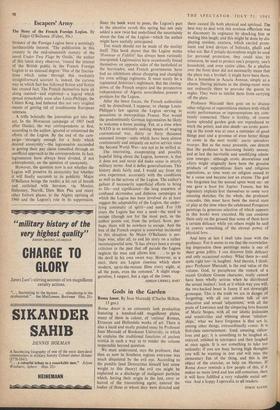Escapers' Army .
STORIES of the Foreign Legion have a seemingly inexhaustible interest. 'The publication in this country in the mid-nineteenth century of the novel Under Two Flags by Ouida,' the author of this latest story observes, 'roused the interest of the British public in the French Foreign
• Legion to an unusual degree.' One of the fascina- tions which come through this resolutely straightforward account is, indeed, the curious way in which fact has followed fiction and fiction has created fact. The French themselves have all along resisted—and exploited—a legend which spread remarkably soon after Louis-Philippe, the Citizen King, had fathered this not very original means of getting rid of troublesome European veterans.
A trifle belatedly the journalists got into the act. In the Moroccan campaign of 1907 (well after Ouida), the war correspondents at first, according to the author, ignored or minimised the efforts of the Legion. By the end of the cam- paign—'strangely enough for a body which desired anonymity'—the legionnaires succeeded in getting their pay claim remedied through, an unofficial approach to the correspondents. In fact, legionnaires have always been divided, if not schizophrenic, on the question of anonymity.
However, the question now is not whether the Legion will preserve its anonymity' but whether it will finally succumb to its publicity. Major O'Ballance brings the reader, a bit out of breath and surfeited with heroism, via Mexico, Dahomey, Narvik, Dien Bien Phu and many other forlorn places, to the Algiers uprising of 1960 and the Legion's role in its suppression. Since the book went 'to press, the Legion's part in the abortive revolt this spring has not only
added a new twist but underlined the uncertainty about the fate of the Legion—which the author might have usefully anticipated.
Too much should not be made of the mutiny itself. This book shows that the Legion motto `ifonneur et Fidelite has always been variously
interpreted. Legionnaires have occasionally found themselves on opposite sides of the battlefield or the barricades; and French governments have had no inhibitions about chopping and changing (or even selling) regiments. It must surely be a regimental historian's nightmare. But the closing- down of the French empire and the prospective independence of Algeria nevertheless present a problem for the Legion.
After the latest fracas, the French authorities will be disinclined, I suppose, to change Louis- Philippe's law against the Legion serving in peacetime in metropolitan France. Nor would the predominantly German legionnaires be likely to welcome a home posting. Yet, at a time when NATO is so anxiously seeking means of waging conventional war, thirty or forty thousand seasoned troops—units which have been almost continuously and uniquely on active service since the Second World. War—are not to be sniffed at.
The interesting, exasperating and possibly hopeful thing about the Legion, however, is that it does not and never did make sense in strictly military terms. And it defies generalisations. This history deals fairly and, I would say from my own experience, accurately with the conditions as well as the actions of the Legion. The author's gallant if necessarily superficial efforts to bring to life—and significance—the long sequence of confused skirmishes and dubious campaigns in which the Legion has been involved do at least suggest the adaptability of the Legion, the under- lying continuity of spirit—and need. For 130 years the Legion has met a need—the need to escape (though not for the most part, as the author points out, from the police). Soon, per- haps, there will be nowhere to escape. And the loss of the French empire is somewhat incidental to this situation. So Major O'Ballance is per- haps wise, after all, to end his story on a rather inconsequential note. 'It has always been a strong criticism in the past that off parade the Legion neglects the man and allows him . . . to go to the devil in his own sweet way. However, as a start, there are Legion cinemas which show modern, up-to-the-minute films every night, at all the posts, even the remotest.' A slight exag- geration, I suspect, but a sign of the times.
ADRIAN LIDDELL HART


















































 Previous page
Previous page